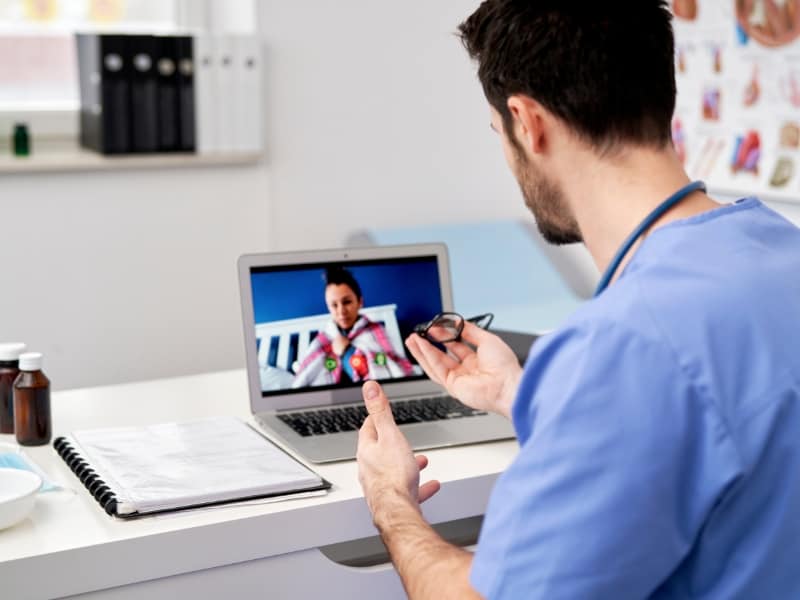To effectively treat patients through telehealth, it’s crucial for nurses to possess advanced communication and clinical skills.
As a result, when interviewing candidates for telehealth nursing positions, employers often focus on evaluating both their clinical knowledge and communication abilities.
To help you prepare for telehealth nursing interviews, I’ve compiled a list of ten questions and their corresponding answers that can assist you in showcasing your expertise and skills.
Telehealth Nursing Interview Questions and Answers
Below are the sample interview questions for a telehealth nursing position.
Remember, the goal of this article is so you can start thinking about how you would answer telehealth nursing interview questions if you received a question that was similar to one of these.
If you’re looking for more nursing job opportunities. Make sure to check out our job board.
1. What Do You Think Are The Best Qualities A Telehealth Nurse Should Have?

When answering this question, try to use your best qualities and relate them to telehealth nursing.
A telehealth nurse has a unique job in that she does not provide care to patients in person but remotely. The employer must be assured that you understand and are prepared to provide remote patient care.
Answer:
“I think a telehealth nurse needs to communicate well. She needs to communicate with patients calmly and clearly so that patients understand what she is telling them.
She also needs to have patience and empathy to be able to provide care remotely.”
2. Explain The Technique You Would Use To Establish a Positive Communication With A Patient Over The Phone Or A Video Call.
The interviewer needs to assess whether you can provide medical care to patients remotely.
The skills you use to obtain correct and complete information from patients are very important.
Receiving incorrect information may lead to incorrect patient care, which may lead to poor outcomes for the patient.
Answer:
“Before I ask the patient about their medical complaint, I like to take a minute or so to focus on building rapport with them.
Asking them a medically unrelated question shows that I care about them as people, and they respond by providing more detailed clinical information when I ask for it.
By creating this open communication channel, I get more honest and detailed information, allowing me to deliver better, more targeted treatment and increase patient safety.”
3. How Would You Assess A Patient’s Health Needs Over A Phone Or Video Call?
These application questions show the interviewer how you apply your skills and clinical knowledge to a telehealth setting.
You can use examples from your previous experience or tell the interviewer how you envisage the interaction between the patient and you.
Answer:
“First, I take a minute to establish rapport with the patient and introduce myself; I then proceed to ask open-ended questions about their symptoms and medical history.
I let the patient tell me in their own words why they are seeking medical help and explain what they are feeling.
Exploring their symptoms gives me a broader picture of possible diagnoses and allows me to suggest possible treatments.
Once I’ve assessed the problem, I let the patient know what the plan of care will be and explain the next steps so they know what to expect.”
4. Do You Have A Special Technique You Use To Control Mistakes In Your Work?

Accuracy in assessing and recording patients’ details and medical care needs is of top importance in a role of a telehealth nurse.
Use an example of what you usually do to ensure you don’t make mistakes when you work.
Answer:
“To make sure I make as few mistakes as possible, I listen carefully to others and often make short notes of the key points of the conversation.
I also try as far as possible to chart all the treatment and care I provide to each patient immediately after I do it so that I don’t forget anything and to ensure that patients’ records are correct and up to date at all times.”
5. Give An Example Of When You Provided Holistic Care To A Patient.
Providing holistic care means treating the patient as a whole person and addressing more than just their symptoms.
Your answer will help the interviewer assess your ability to connect with patients and show your interpersonal skills.
Answer:
“I once had a patient with an infected wound on her foot who insisted that she would not be able to go to the hospital to receive treatment.
I talked to her a little about her life and her reasons for refusing treatment.
I learned that she was the sole caregiver looking after her aged mother and could not leave her alone while she spent some time at a hospital.
I contacted the social worker, who visited the patient, and together we devised a plan where a carer could come every day to care for the frail mother while my patient went to the hospital to receive treatment for the wound on her foot.
This way, I could treat my patient and relieve her family situation.”
6. How Would You Ask A Patient To Describe The Level Of Pain They Are Experiencing?
This question probes further into your skills to assess a patient’s symptoms without seeing them physically.
Use your experience to show the interviewer how you helped a patient describe pain or other symptoms so that they can understand what is happening to them.
Answer:
“I had a patient once who complained that his chest felt like an elephant was sitting on it, and it was painful to breathe.
I understood he meant that he was short of breath; I made him sit down and observed his breathing for a minute.
His respiration rate was elevated, and he took shallow, fast breaths. I then spoke calmly to him.
The patient followed my instructions, and slowly his breathing returned to normal. It turned out he had a panic attack.”
7. What Would You Do If You Could Not Diagnose a Patient’s Condition After Assessing Them Remotely?
This question shows the interviewer your problem-solving skills.
Employers look for candidates who can overcome challenging situations, so make sure your answer explains the steps you take when faced with a challenging situation.
Answer:
“If I weren’t sure what is wrong with the patient, I would continue to ask open-ended questions about their symptoms to gain more information and insight into the possible diagnosis.
If a patient could not give me more information, I would consult with my supervisor or a more experienced colleague. Together we would design the plan of care for this patient.”
8. Tell Me More About Your Experience With Teaching Patients About Their Health.

A telehealth nurse needs to provide patient education.
The interviewer wants to determine how confident and comfortable you are about teaching patients to take better care of themselves.
Your answer should be based on an example of when you taught someone about their health and include the information you gave them and the reasons for choosing that information.
Answer:
“I learned how to teach patients about their health by volunteering to teach in our hospital’s free clinic, where patients could attend free classes.
Whenever I need to explain a complicated health problem, I break it down into smaller topics.
For instance, if I need to teach patients about diabetes, I will first explain what diabetes is, then go into what symptoms patients can expect, then introduce the different treatment options.”
9. Do You Have Any Experience Using Any Of The Telehealth Technologies?
Telehealth nurses need to rely on technology to deliver care. That is why you must be familiar with the most used technology in the field.
To answer this question, list any technologies you used in the past and how they helped you in your duties.
Answer:
“I find video conferencing software the most useful. It allows me to see patients’ expressions and body language to understand their concerns or questions better.
I also use the screen sharing software to share files and care plans to work together with each patient to design personalized care plans.”
10. What Makes You A Good Candidate To Be A Telehealth Nurse?
The interviewer needs to assess if you have the necessary skills to be a successful telehealth nurse.
Your answer should highlight your most important skills, like effective communication with patients and the healthcare team. You can also mention any previous experience that relates to telehealth nursing.
Answer:
“I am passionate about helping others, especially those who cannot access medical facilities.
In my previous positions, I always delivered high-quality care to all my patients, and now I look forward to providing care to patients who are homebound due to illness or injury.”
Key takeaways
Telehealth nursing is a complex position that requires a skilled professional.
The interview will reflect the significance of the position. To get hired, make sure you prepare well to sound calm and confident when you give your answers.
Have You Read These Yet?
- Telemetry Nursing Interview Questions and Answers
- Aesthetic Nursing Interview Questions
- Postpartum Nursing Interview Questions
- Interview Questions For a Nursing Supervisor Position
- Interview Questions For a Public Health Nursing Interview Position
